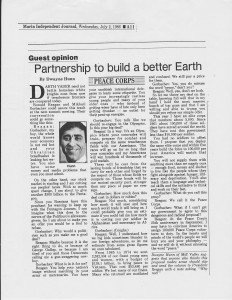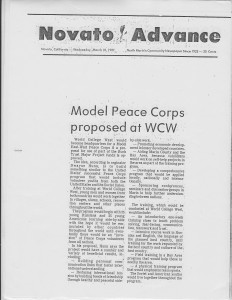
Tuesday, Sept. 3, 1985, Marin Independent Journal
OPINION \ EDITORIALS
We must plant the seeds of peace
By Dwayne Hunn
FOR MORE THAN A DECADE the deserts have spread over once-productive African lands. Now African famines are the harvests being reaped. In our Latin American back yard inflation soars, insurrections take innocent lives, governments tumble and communist regimes spring up or become more likely.
Our answer? Politically, the out-of-power party blames the in-power party for not implementing a long-range plan to combat such tragedies and evils. What I propose is a program for which both parties can take credit – the Democrats for initiating it and the Republicans for expanding it. Ronald Reagan, the Great Communicator of this decade, could assure his place on the list of great presidents by a simple bold but peaceful move.
In the early 1960s, Sargent Shriver, the Peace Corps first director, said:
“If the Pentagon’s map is more urgent, the Peace Corps is, perhaps, in the long run the most important…What happens in India, Africa, and South America – whether the nations where the Peace Corps works succeed or not – may well determine the balance of peace.”
In 1966 America spent $114 million to send 15,556 Peace Corps volunteers into service, the most dollars ever committed to volunteers.
At the time, Sen. Jacob Javits proposed a Peace Army of a million young men. Labor leaders advocated a service corps of 100,000. The Peace Corps first deputy director, Warren Wiggins, called for a corps of 30,000 to 100,000.
In 1984 America spent approximately $108.5 million and sent approximately 5,200 volunteers into service.
What happened? Had the world’s plight improved so much that we could cut the Peace Corps by two-thirds? Were the hearts and minds of enough Third World people swayed to see the economic and social benefits of the democratic way? Had communist-inspired turmoil and revolt diminished? Did we find a better way to let the world know who we Americans were than by exporting our skills, courage and heart through the Peace Corps?
From 1965 to 1974, we assigned 2,582,304 soldiers with a budget of $138.1 billion to defoliate, mutilate and whore over the countryside of Vietnam. The cost for these services was $53,480 per soldier. In that same period we sent 108,579 Peace Corps volunteers with a budget of $956 million to teach, build and inspire over the world. The cost was $8,809 per volunteer.
If America had used the Southeast Asian war budget to send volunteers into the world, America could have sent more than 15 million people out to plant crops, ideas and ideals. Which choice do you think would have most benefited our long-term national security desires? Our economy? The global village’s needs?
Former California Congressman John Burton in his last Washington Report to his constituents wrote in 1981:
“When I was first elected to Congress eight and one-half years ago, some of the issues facing us were the war in Vietnam, the escalating arms race… Now as I leave Congress, the issues are American involvement in Nicaragua and other parts of Central America, which might become the next Vietnam, the nuclear arms race typified by the MX missile…”
What America needs today is leadership that will put 100,000-plus volunteers into the field of economic development:
- Challenging communist economic ideas with practical programs.
- Helping Africa reclaim its desert and grow food.
- Pitting the character of the working volunteer against the slogans of radicals and terrorists attempting to antagonize the masses.
- Establishing the economic and educational infrastructure of developing countries.
Then we need leadership that challenges the Russians to do the same. President Reagan is the only leader that could do this today.
In 1963 President John Kennedy said:
“In some small village, volunteers will lay a seed which will bring a rich harvest for us all in later days.”
He was right. It happened. But the crop comes from small gardens. We should be tilling fields upon fields. The time is late. We need to lay more seeds.
Dwayne Hunn of Mill Valley sewed in the Peace Corps in India from 1966-68 and speaks to groups about the importance of the Peace Corps.

Marin Independent Journal, Wednesday July 2, 1986
Partnership to build a better Earth
By Dwayne Hunn
DARTH VADER need not battle homeless white knights eons from now if treacherous frontiers are conquered today.
Reagan: Gorbachev, my boy, the whole world knows your economy is not red hot and your Ukrainian breadbasket is leaking hot water. You also have some money and media problems that even you must admit.Ronald Reagan and Mikhail Gorbachev could assure this result at the next summit meeting. Their conversation could go something like this:
On the other hand, our stock market is sizzling and I am cutting our peoples’ taxes. With so much spare change, I am about to give another $300 billion to the Pentagon.
Since you Russians have this penchant for wanting to keep up with the Pentagon Jones. I can imagine what this does to the nerves of the Politburo’s allowance-givers. So I am about to make you an offer you would be a fool to refuse.
Gorbachev: Why would a politician such as you make me a good deal?
Reagan: Maybe because it is the right thing to do, or because I am tired of you and those Democrats calling me a gun-swaggering cowboy.
Gorbachev: What is in it for me?
Reagan: You help your nation’s image without marching in your army or mercenaries. You force your snobbish international delegates to learn some etiquette. You give your increasingly restless young people and many of your older ones – who instead of getting wiser have of late only been getting drunker – an outlet for their pent-up energies.
Gorbachev: You talk like we should re-engage in the Olympics. Is this your big deal?
Reagan: In a way. It’s an Olympics where your comrades will train, prepare for combat and compete on the same treacherous fields with our Americans. The races will go on for so long that your
comrades and my Americans will win hundreds of thousands of gold medals.
These will be cast from the lasting bonds of friendship that we carry for each other and forged by the respect of those whose fields we triumph on. Those bonds will be our mutual security pact, stronger than any piece of paper we ever sign.
Gorbachev: How much does this deal cost in dollars or rubles?
Reagan: Not much, considering how much it will save and how much world trade it will bring us. I could probably give you an estimate if you could tell me how much it is costing you per soldier in Afghanistan and merceneary in Africa.
Gorbachev: (Coughs.)
Reagan: Well, I understand how we big kids sometimes blunder in our foreign adventures, so let me estimate from some gross figures we once tabulated.
From 1965 to 1974 we sent 2,582,304 of our finest young men and women, with a budget of $138.1 billion, to bring peace to Vietnam. That cost $53,480 per soldier. We lost many of our finest. Many who returned are mutilated and confused. We still pay a price for them.
Gorbachev: Yes, you do misuse the word “peace,” don’t you?
Reagan: Well, yes, don’t we both. So let me throw my deal on the table, knowing full well that in my hand I hold the most massive bunch of top guns and that I am willing and able to trump you should you refuse my simple offer.
This year I have an elite corps that numbers about 5,000. Since 1961 about 100,000 of these soldiers have served around the world. They have cost this government less than $10,000 per soldier:
You had no soldiers to offset them. I propose that you deploy the same elite corps and within five years build the force to 100,000 per year. America will match that increase.
You will not supply them with anything more than we supply ours — enough food, money and shelter to live like the people whom they fight alongside against hunger, illiteracy and deprivation. You’ll also teach them a language and technical skills and the initiative to think and work on their feet.
Gorbachev: What do you call this army?
Reagan: We call it the Peace Corps.
Gorbachev: What if I can’t get my government to agree to this dangerous and radical proposal?
Reagan: At the Peace Corp’s 25th anniversary in September, 1 may have to convince America to assign 100,000 Peace Corps volunteers to duty. In the hearts and minds of the world’s people we will bury you and your philosophy —and we will do it without misusing the word “peace.”
Dwayne .Hunn of Mill Valley suggests that anyone who thinks this proposal makes sense should clip and send the column to President Reagan with a note asking, “Why not?”

March 18, 1987 Novato Advance
Model Peace Corps proposed at WCW
By Dwayne Hunn
World College West would become headquarters for a Model East-West Peace Corps if a proposal for use of part of the Buck Trust Major Project funds is approved.
The idea, according to originator Dwayne Hunn, is to build something similar to the United States’ successful Peace Corps program that would include volunteer youths from both the United States and the Soviet Union.
After training at World College West, young men and women from both countries would work together, in villages, slums, schools, recreation centers and other places throughout the world.
The program would begin with 25 young Russians and 25 young Americans learning side-by-side with the hope it would be emulated by other countries throughout the world until eventually there would be an “invasion” of Peace Corps volunteers from all nations.
In his proposal, Hunn says the project would have a number and variety of beneficial results, including:
–Building personal communication links that foster international understanding.
–Reducing international tension by building bonds of friendship through healthy and peaceful side-by-side work
–Promoting economic development in lesser developed countries.
–Aiding Mann County and the Bay Area, because volunteers would work on self-help projects in the area as part of the training program.
–Developing a comprehensive program that would be applied locally, nationally and internationally
–Sponsoring conferences, seminars and discussion groups in Marin to help further understanding between nations.
The training, which would be conducted at World College West, would include:
–An introductory one-week training class to teach problem-solving, fear-facing, communication, teamwork and trust.
–Intensive course work in Russian and English, the language of the planned host country, skill training for the work requested by the host country and culture of the host country. .
–Field training in a Bay Area program that would help those in need in the area.
–A physical training program that would emphasize team sports.
The Soviet and American youths would live together throughout the program.
